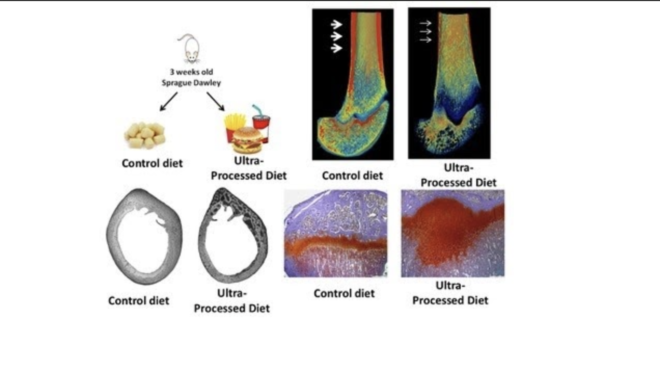 Kids and the food they eat. Parents know that junk food affects their teeth, their BMI and their mood –– and now scientists see worrying and long-lasting effects on the bones of children who consume junk food.
Kids and the food they eat. Parents know that junk food affects their teeth, their BMI and their mood –– and now scientists see worrying and long-lasting effects on the bones of children who consume junk food.
Researchers from the Hebrew University show how ultra-processed junk foods and reduce bone quality, unveiling the damage of these foods particularly for younger children in their developing years.
The study, led by Professor Efrat Monsonego-Ornan and Dr. Janna Zaretsky from the Department of Biochemistry, Food Science and Nutrition at the University’s Faculty of Agriculture, was published in the journal Bone Research and serves as the first comprehensive study of the effect of widely-available food products on skeleton development.

Ultra-processed foods—aka, junk food like McDonald’s, white bread, Coke, granola bars, sweetened breakfast cereal —are food products that undergo several stages of processing and contain non-dietary ingredients.
They’re popular with consumers because they are easily accessible, relatively inexpensive and ready to eat straight out of the package. And, well, kids love them. They are engineered that way. The increasing prevalence of these products around the world has directly contributed to increased obesity and other mental and metabolic impacts on consumers of all ages.
As much as 70% percent of their caloric consumption are estimated to come from ultra-processed foods. While numerous studies have reflected on the overall negative impact of junk food, few have focused on its direct developmental effects on children, particularly young children.
The Hebrew University study provides the first comprehensive analysis for how these foods impact skeletal development. The study surveyed lab rodents whose skeletons were in the post embryonic stages of growth. The rodents that were subjected to ultra-processed foods suffered from growth retardation and their bone strength was adversely affected.
Under histological examination, the researchers detected high levels of cartilage buildup in the rodents’ growth plates, the “engine” of bone growth. When subjected to additional tests of the rodent cells, the researchers found that the RNA genetic profiles of cartilage cells that had been subjected to junk food were showing characteristics of impaired bone development.

They divided the rodents’ weekly nutritional intake—30% came from a ‘controlled’ diet, 70% from ultra-processed foods. They found that the rodents experienced moderate damage to their bone density albeit there were fewer indications of cartilage buildup in their growth plates. “Our conclusion was that even in reduced amounts, the ultra-processed foods can have a definite negative impact on skeletal growth,” Monsonego-Ornan said.
These findings are critical because children and adolescents consume these foods on a regular basis to the extent that 50 percent of American kids eat junk food each and every day.
Monsonego-Ornan added: “When Carlos Monteiro, one of the world’s leading experts on nutrition, said that there is no such thing as a healthy ultra-processed food, he was clearly right. Even if we reduce fats, carbs nitrates and other known harmful substances, these foods still possess their damaging attributes. Every part of the body is prone to this damage and certainly those systems that remain in the critical stages of development.”
What is ultra-processed food?
According to Harvard, processing changes a food from its natural state. Processed foods are essentially made by adding salt, oil, sugar, or other substances. Examples include canned fish or canned vegetables, fruits in syrup, and freshly made breads. Most processed foods have two or three ingredients.
Ultra-processed foods normally contain ingredients that you wouldn’t add when cooking homemade food. You may not recognise the names of these ingredients and you won’t be able to pronounce them as many will be chemicals, colourings, sweeteners and preservatives.
Time to get making sourdough bread. LOL. Read our 4 part series starting here from our in-house expert. This is our solution for everything. Or start a Victory Garden.



